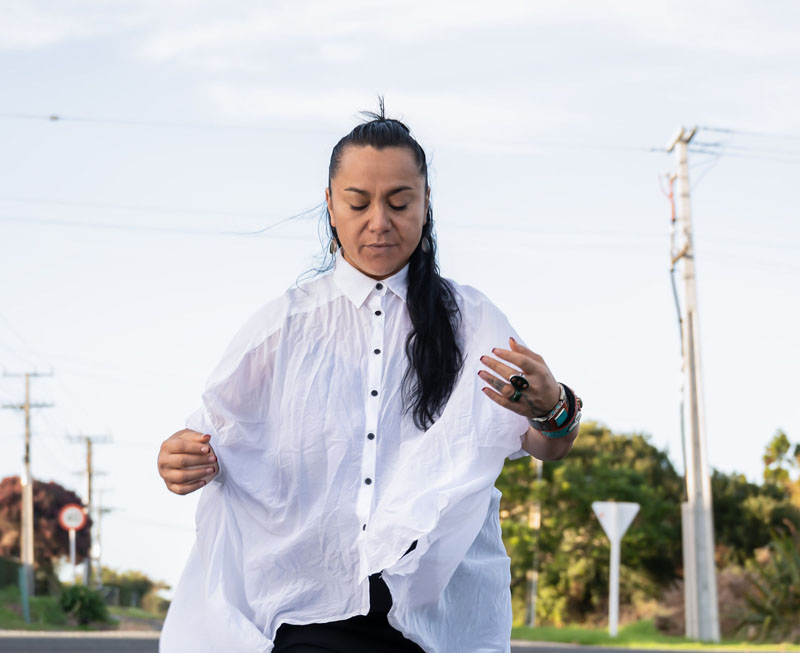A programme offering a range of toi Māori, including dance and movement, music and art, will run at Auckland Region Women's Corrections Facility for the second time later this year and again in 2025.
 Dr Tia Reihana (Ngāti Hine), a senior lecturer in dance studies at the University of Auckland, has been working in dance and dance education for 30 years. Piripi Morunga (Ngāpuhi) is a Rongoā practitioner with more than 18 years’ experience in health and community education.
Dr Tia Reihana (Ngāti Hine), a senior lecturer in dance studies at the University of Auckland, has been working in dance and dance education for 30 years. Piripi Morunga (Ngāpuhi) is a Rongoā practitioner with more than 18 years’ experience in health and community education.
Last year, Tia and Piripi delivered He Mana Wāhine Toi Rongoā programme to 12 wāhine at Auckland Region Women's Corrections Facility. The programme is one of 13 programmes funded over three years through the Creative Arts and Cultural Wellbeing Prison Initiative. a partnership between Manatū Taonga and Ara Poutama Aotearoa. Read more about the Prison Initiative
Tia says the Initiative has provided them with an “important and valuable” opportunity to share their skills and knowledge with the participants.
The programme at the Auckland facility offers wāhine Māori participants opportunities to engage with kaupapa Māori healing methods of toi rongoā to foster improved health and wellbeing.
"What blew me away was the immense generosity of the women, their manaakitanga and eagerness to explore what was offered in the course content,” Tia says. “Their commitment to the programme and the level of conversation was something I looked forward to every session.”
"Great support from prison staff and committed wāhine"
For Tia and Piripi, it was their first time delivering a prison programme. They had, however, supported research projects and other community practitioners going into prisons.
 “We designed and delivered a programme with great support from prison staff and committed wāhine," Tia recalls. "It was a meaningful experience, and we're excited about doing it again in October.
“We designed and delivered a programme with great support from prison staff and committed wāhine," Tia recalls. "It was a meaningful experience, and we're excited about doing it again in October.
"There were many moving parts and resourcing required, particularly introducing a new programme. It took a lot of communication, support and flexibility from everyone, including the participants."
For Piripi, who runs a business focused on health and wellbeing, being flexible and able to adapt quickly was vital.
“The response from the wāhine – their engagement, attendance and how they held the space – was great, and we saw the value of our rongoā.
“A highlight for me was seeing an awareness in the wāhine about themselves. It was heartening to see a spark ignited."
He Mana Wāhine Toi Rongoā programme
He Mana Wāhine Toi Rongoā programme ran two-hour sessions most weekdays over five weeks. It included:
- Manu waewae dance workshops using rākau and kanikani (dance) to develop fitness, coordination, discipline, creative thinking and problem-solving, and to demonstrate the healing benefits of movement
- Rongoā Māori, a traditional Māori healing system
- Taonga pūoro, kōauau Māori flute-making and learning the healing characteristics, history and pūrukau (stories) specific to Māori
- Ngākau oho, movement and meditation sessions combining traditional Māori healing in a space that awakens an awareness of participants’ holistic being
- Mirimiri, oral and written expression, sharing through artistic expression (drawing, painting and writing journals), spoken word (poetry and personal response), and te reo Māori (waiata and whakatauki).
- The programme provided participants with a culturally meaningful setting to share their knowledge of tikanga and te reo Māori. Within this setting, the many benefits included fostering greater self-awareness, positive identity and whānau hauora (health and wellbeing); improved interpersonal relationships and collaboration; and new skills and confidence.
Tia and Piripi say that evaluating the impact of the three-year programme is essential. Using kaupapa Māori principles, they start with the participants and their whānau, then extend the evaluation to prison staff and funding leads.
Evaluating the impact of the three-year programme
A feature of the Creative Arts and Cultural Welling Prison Initiative is the ongoing evaluation of each of the 13 programmes. Research companies Point and Associates Ltd and Awa Associates are working with Tia and Piripi to evaluate the programme's impact over the three years.
Leading into the second delivery of their programme at Auckland Region Women’s Corrections Facility, Tia and Piripi say that it’s important to remain responsive to the needs of the wāhine and the site.
"We don't come in as experts," Tia says. "It's a shared space where we work alongside the wāhine and their whānau, hearing their stories.”
In the long term, knowing the positive impact of He Mana Wāhine Toi Rongoā, Tia and Piripi say they would love to see the programme extended. “It’s not about us. It’s about other practitioners being able to do this important work with women and men in prisons.”



